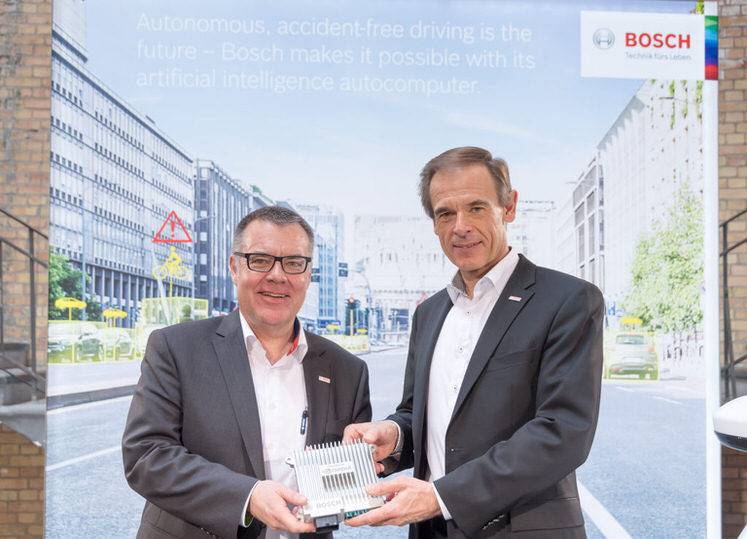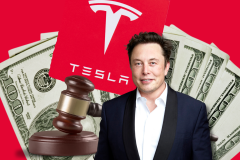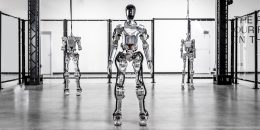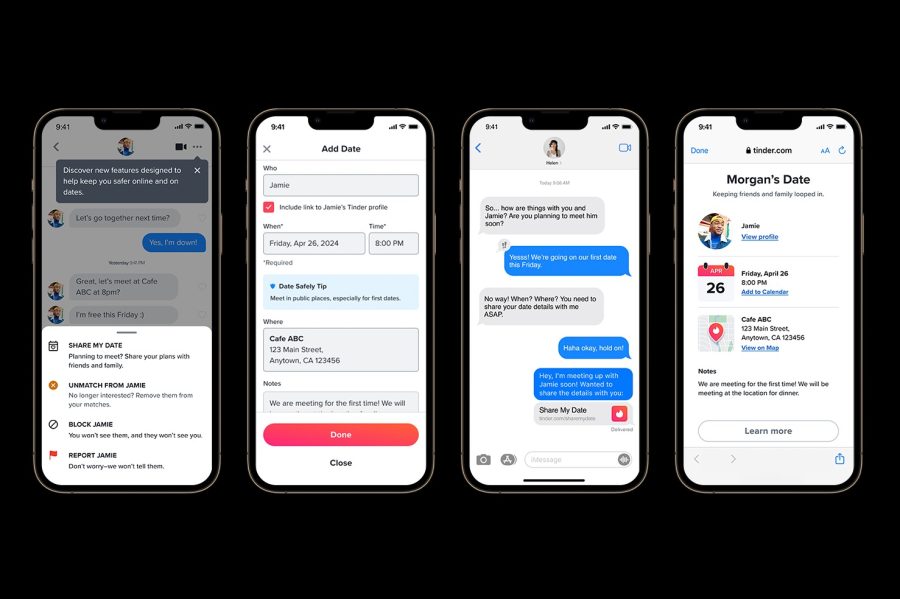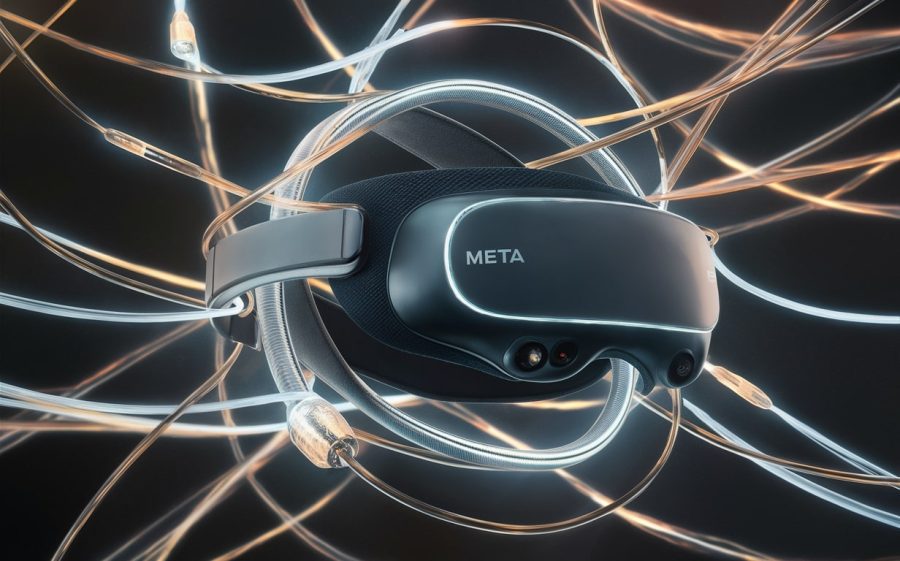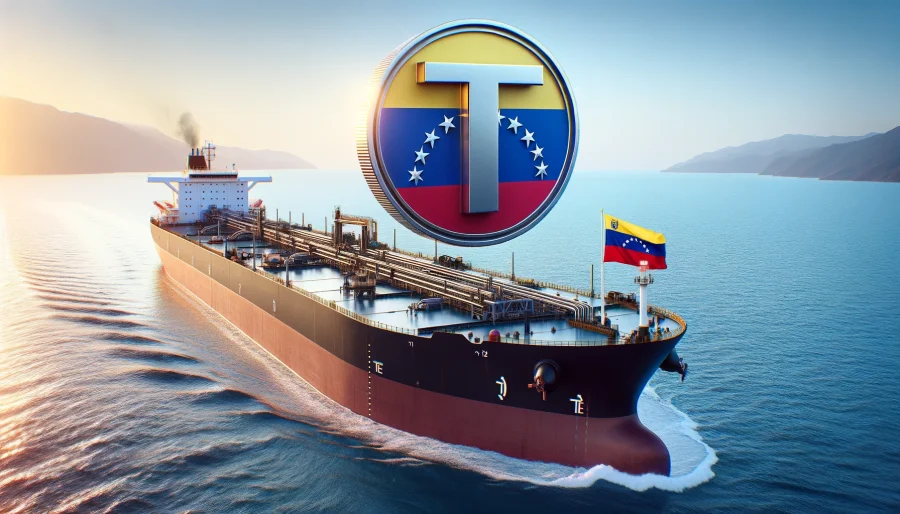Bosch is creating the brain for the self-driving cars of the future.
At the international Bosch ConnectedWorld 2017 conference in Berlin this week, the supplier of technology and services presented an onboard computer for automated vehicles.
Thanks to artificial intelligence, the computer can apply machine learning methods. The AI onboard computer is expected to guide self-driving cars through even complex traffic situations, or ones that are new to the car. “We are teaching the car how to maneuver through road traffic by itself,” said Dr. Volkmar Denner, chairman of the Bosch board of management.
Cars already use Bosch sensors to monitor their surroundings. Using artificial intelligence, it will also be able to interpret those readings to make predictions about the behavior of other road users. “Automated driving makes roads safer, and artificial intelligence is the key to making that happen. We are making the car smart,” continued Denner.
Nvidia will supply Bosch with a chip that stores algorithms, generated with machine learning methods. The AI onboard computer is expected to go into production by the beginning of the next decade at the latest. Driverless cars to be part of everyday life in the next decade Bosch’s AI onboard computer can recognize pedestrians or cyclists.
See also: What if the Super Bowl had AI referees?
Besides this ability, known as object recognition, artificial intelligence also makes it easier for automated vehicles to assess a situation. For instance, cars that have their turn signals on are more likely to change lanes than those that do not. As a result, a self-driving car with AI can recognize and assess complex traffic situations, such as when an oncoming vehicle executes a turn, and factor these into its own driving.
The computer stores whatever it learns while driving in artificial neural networks. Experts review this knowledge in the lab for accuracy. Following further testing on the road, the artificially generated knowledge structures can be transmitted to any number of other AI onboard computers in an update.
NVIDIA CEO Jen-Hsun Huang detailed how deep learning is fueling an AI revolution in the auto industry: “I’m so proud to announce that the world’s leading tier-one automotive supplier — the only tier one that supports every car maker in the world — is building an AI car computer for the mass market.
First adoption of Nvidia’s Xavier technology
The collaboration with Bosch represents the first announced DRIVE PX platform incorporating NVIDIA’s forthcoming Xavier technology. Xavier can process up to 30 trillion deep learning operations a second while drawing just 30 watts of power. That power is needed to achieve what the automotive industry refers to as “Level 4 autonomy,” where a car can drive on its own, without human intervention. The number of cars with various levels of autonomy will grow to a total of 150 million vehicles by 2025, analysts project.
Huang said his company will deliver technology enabling Level 3 autonomous capabilities (in which a car can drive on its own but still needs a driver to intervene under various conditions) by the end of this year, and Level 4 capabilities by the end of 2018.
While cars on the road now are capable of detecting vehicles in front of them and braking when needed, the requirements for autonomous driving are more demanding. Instead, deep learning can enable us to train a car to drive, and ultimately perform far better — and more safely — than any human could do behind the wheel.
“We’ve really supercharged our roadmap to autonomous vehicles,” Huang said. “We’ve dedicated ourselves to build an end-to-end deep learning solution. Nearly everyone using deep learning is using our platform. Of course, our goal someday is that every single car will be autonomous.” “But for the path to then, we’ll have AI that will be your co-pilot, will be your guardian, and look out for you.”
Powered by deep learning, AI co-pilot can recognize faces to automatically set specific preferences in the car depending on the driver. The system can also see where the driver is looking, and detect expressions to understand the driver’s state of mind. Combining this information with what is happening around the car enables the AI co-pilot to warn the driver of unseen potential hazards.
In addition, the system has the ability to read lips. So even if the radio is cranked up, the car can understand a driver’s instructions.
Bosch sees AI in its future
“We want automated driving to be possible in every situation. As early as the next decade, driverless cars will be also a part of everyday life. Bosch is advancing automated driving on all technological fronts. We aim to assume a leading role in the field of artificial intelligence, too,” said Denner.
He went on to say that artificial intelligence would play a key role in all areas of business at Bosch, not just mobility: “Just ten years from now, it will be virtually impossible to conceive of a Bosch product that does not involve artificial intelligence in some way. The products will either have it or be created with its help.” At the beginning of this year, the company announced it was establishing a Center for Artificial Intelligence. Bosch is investing some 300 million euros in expanding its expertise in this area.
